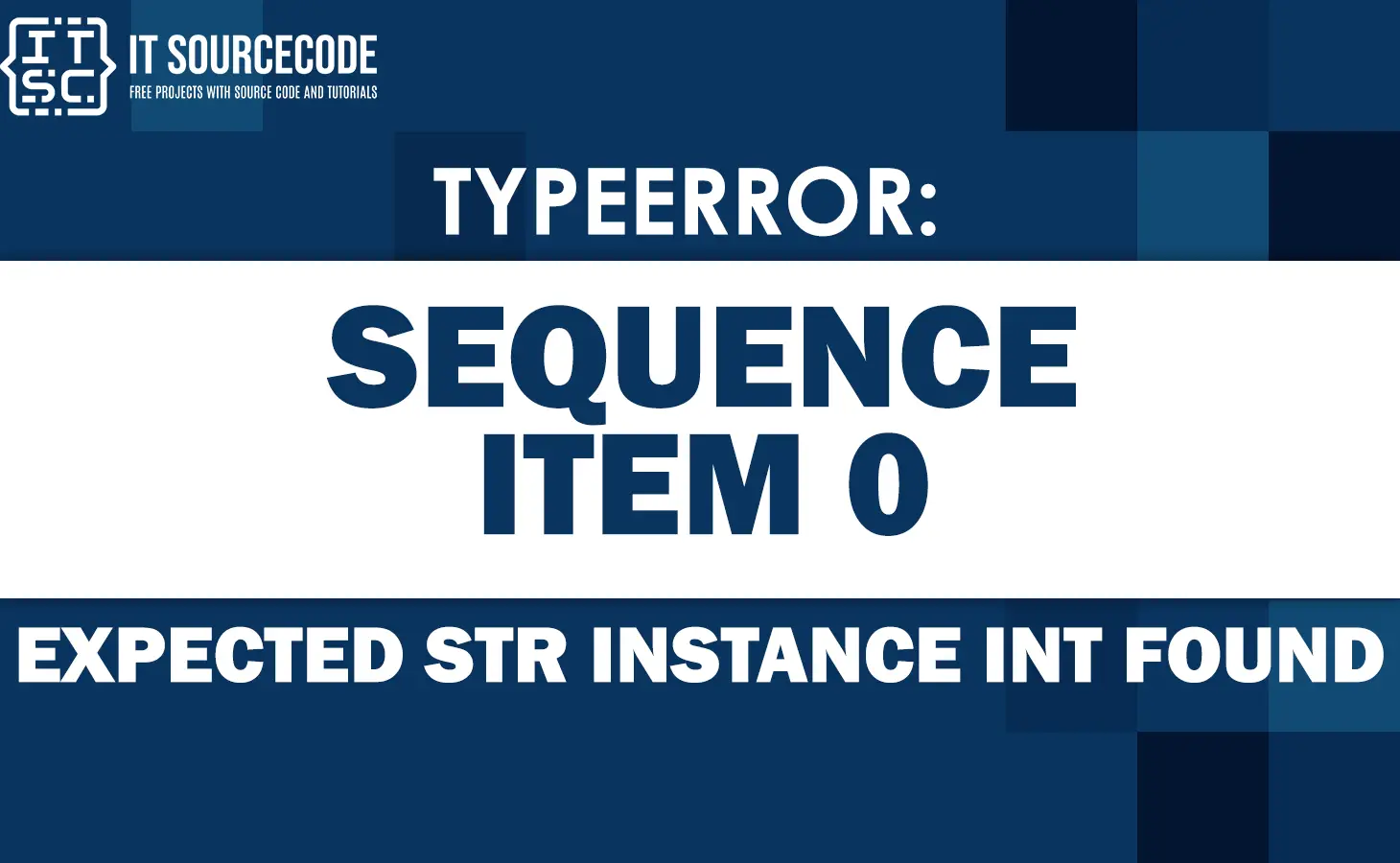Are you looking for a solution to fix the error message “Typeerror sequence item 0 expected str instance int found” in your code?
Then you are in the right place.
In this article, we will discuss the possible causes of “Typeerror sequence item 0 expected str instance int found”, and provide solutions to resolve the error.
But first, let us know what this error means.
What is Typeerror sequence item 0 expected str instance int found?
The “Typeerror sequence item 0 expected str instance int found” is an error message indicating that the type of data encountered is not compatible with what the program expects.
It tells that there is a problem with the data types used in a sequence in your code.
The code expects the first item in the sequence to be a string, but instead, it finds an integer.
Now let us know why and how this error occurs.
How does Typeerror sequence item 0 expected str instance int found occurs?
The “Typeerror sequence item 0 expected str instance int found” occurs when the join() method is called with an iterable that contains one or more non-string elements, such as integers or floats.
The join() method is used to concatenate strings in an iterable, and expects all elements in the iterable to be strings.
Here is an example that trying to join a list of integers with a string using the join() method:
my_list = [1, "two", "three"]
joined_string = "-".join(my_list)
print(joined_string)In this example, it tries to join a list with a hyphen using the join() method and save the result in joined_string.
However, since the first item in my_list is an integer, and join() expects a string, we get the following error message:
TypeError: sequence item 0: expected str instance, int foundNow let’s fix this error.
Typeerror sequence item 0 expected str instance int found – Solutions
Here are some ways to fix the “sequence item 0 expected str instance int found” error, along with examples of how to implement them and the expected output:
Solution 1: Use the map() function:
To fix the “sequence item 0 expected str instance int found” error, Use the map() function to convert non-string elements to strings before using the join() method.
The map() function applies a specified function to each item in an iterable and returns a new iterable with the results.
Here’s an example code snippet using the map() function:
my_list = [1, "two", "three"]
joined_string = '-'.join(map(str, my_list))
print(joined_string)In this example, we pass the str() function and the my_list iterable to the map() function.
Which applies the str() function to each item in the list and returns a new iterable with the results.
We then use the join() method to join the resulting strings with a hyphen.
Output
1-two-threeSolution 2: Use a generator expression:
Another way to fix the “sequence item 0 expected str instance int found” error is to use a generator expression.
Use a generator expression to convert non-string elements to strings before using the join() method.
A generator expression is similar to a list comprehension.
But instead of creating a list, it creates a generator object that can be used to iterate over the results on the fly.
This can be more memory-efficient than creating a list when working with large iterables.
Here’s an example code snippet using a generator expression:
my_list = [1, "two", "three"]
joined_string = '-'.join(str(item) for item in my_list)
print(joined_string)In this code, we use a generator expression (str(item) for item in my_list) to convert each item in the my_list iterable to a string.
We then use the join() method to join the resulting strings with a hyphen.
Output
1-two-threeSolution 3: Use a list comprehension:
To fix the “sequence item 0 expected str instance int found” error, use a list comprehension by wrapping the expression in square brackets.
Use a list comprehension to convert non-string elements to strings before using the join() method.
A list comprehension is a concise way to create a new list by applying a specified expression to each item in an iterable.
Here’s an example code snippet using list comprehension:
my_list = [1, "two", "three"]
my_list = [str(item) for item in my_list] # convert non-string elements to strings
joined_string = '-'.join(my_list)
print(joined_string)In this example, we use list comprehension [str(item) for item in my_list] to create a new list with each non-string element converted to a string.
Output
1-two-threeSo those are the alternative solutions that you can use to fix the “sequence item 0 expected str instance int found” error.
By following those solutions, surely you can troubleshoot and resolve the error.
Here are the other fixed Python errors that you can visit, you might encounter them in the future.
- typeerror unsupported operand type s for str and int
- typeerror: object of type int64 is not json serializable
- typeerror: bad operand type for unary -: str
Conclusion
In conclusion, The “Typeerror sequence item 0 expected str instance int found” occurs when the join() method is called with an iterable that contains one or more non-string elements, such as integers or floats.
The join() method is used to concatenate strings in an iterable, and expects all elements in the iterable to be strings.
By following the given solution, surely you can fix the error quickly and proceed to your coding project again.
I hope this article helps you to solve your problem regarding a Typeerror stating “sequence item 0 expected str instance int found”.
We’re happy to help you.
Happy coding! Have a Good day and God bless.

